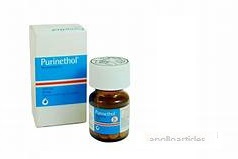Purinethol (Mercaptopurine) Canada
Description
Purinethol is classified as a cancer medication due to the potent impact promoted by its active ingredient. The revolutionary formula of the drug that contains Mercaptopurine as an active ingredient decreases the development and further spreading of cancer cells within the body. Consequently, the medication is useful for treating certain leukemia types. Additionally, the drug action may be boosted by other cancer treatments. Besides, ask your healthcare provider about off-label Purinethol uses and their safety.
Recommendations
 Doctor’s instructions and safety directions are important to follow during Purinethol therapy. Changing the prescription, increasing or decreasing the amount of the medication used, varying the duration of the treatment course and other adjustments can lead to severe complications and side effects. Your healthcare provider should be aware of all the changes that take place during the therapy. Report any issues to your physician, and he/she may occasionally change the specifications for you to experience the maximal benefit from Purinethol use. The treatment is available in several forms. Take the one recommended by your doctor and in accordance with other intake rules. Purinethol can be used with or without food, but with much water.
Doctor’s instructions and safety directions are important to follow during Purinethol therapy. Changing the prescription, increasing or decreasing the amount of the medication used, varying the duration of the treatment course and other adjustments can lead to severe complications and side effects. Your healthcare provider should be aware of all the changes that take place during the therapy. Report any issues to your physician, and he/she may occasionally change the specifications for you to experience the maximal benefit from Purinethol use. The treatment is available in several forms. Take the one recommended by your doctor and in accordance with other intake rules. Purinethol can be used with or without food, but with much water.
The ingredients of the treatment can significantly decrease the blood cell amount. Such an effect will help you fight the infection, but it bears the risk of blood clot occurrence. Frequent blood tests may be required during the therapy. Since the innovative medication will also interfere with kidney and liver work, their functions should also be tested often.
Precautions
Discuss Purinethol intake with your doctor primarily to its beginning. Never start the drug intake if you are allergic to Mercaptopurine or other components of the treatment. Tell your doctor if you have already had experience using the drug, and it showed no results. In certain cases the medication can stimulate fast development and spread of lymphoma. The issue affects bone marrows, liver and spleen, while its symptoms can be fatal. People with accompanying Crohn’s disease, ulcerative colitis, autoimmune disorders and related issues have higher risk of complications.
Additionally, your doctor should know all the information about the illnesses and health disorders you have, especially bacterial, fungal or viral infections, kidney or liver disorders, ulcerative colitis, etc. Pregnant and breastfeeding women should avoid Purinethol intake due to the possible impact on the child.
Drug Interactions
Purinethol may be prescribed for use with other medications, giving an advanced effect. However, the drug can activate dangerous side effects instead, if taken with wrong pharmaceuticals. Provide your healthcare specialist with information about prescription and generic drugs, supplements, vitamins and minerals you are using in order to warn undesirable reactions. Never combine Purinethol with Trimethoprim, Sulfamethoxazole, Warfarin, medications, which weaken the immune system and produce other complications.
Side Effects
Address the nearest emergency room if you have noticed any symptoms of allergic reactions. Call your doctor and stop Purinethol use if other severe side effects started bothering you, especially nausea, vomiting, abnormal bleeding, stomach pain, weight loss, fatigue, lightheadedness, symptoms of infection, appetite loss, jaundice, skin sores, cough, breathing impairments and others.

